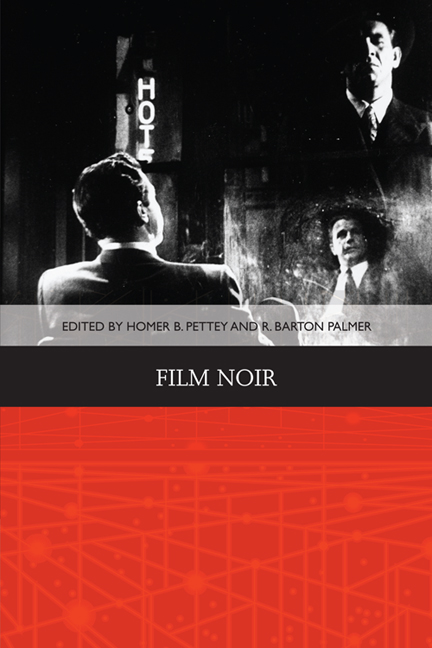Book contents
- Frontmatter
- Contents
- List of Illustrations
- Acknowledgements
- Notes on the Contributors
- Introduction: The Noir Turn
- 1 The Cinema of Uncertainty and the Opacity of Information from Louis Feuillade's Crime Serials to Film Noir
- 2 Warning Shadows: German Expressionism and American Film Noir
- 3 Hard-boiled Tradition and Early Film Noir
- 4 Cold War Noir
- 5 Noiring the Pitch: The Conflicted Soundtracks of Out of the Past, The Blue Gardenia and The Long Goodbye
- 6 Split Screen: Sound/Music in The Stranger/Criss Cross
- 7 Gender and Noir
- 8 The Subversive Shade of Black in Film Noir
- Postscript: A History of Our Writing about Film Noir
- Selected Book Chapters on Film Noir
- Selected Film Noir Books
- Selected Guide to Film Noir
- Index
4 - Cold War Noir
Published online by Cambridge University Press: 05 August 2016
- Frontmatter
- Contents
- List of Illustrations
- Acknowledgements
- Notes on the Contributors
- Introduction: The Noir Turn
- 1 The Cinema of Uncertainty and the Opacity of Information from Louis Feuillade's Crime Serials to Film Noir
- 2 Warning Shadows: German Expressionism and American Film Noir
- 3 Hard-boiled Tradition and Early Film Noir
- 4 Cold War Noir
- 5 Noiring the Pitch: The Conflicted Soundtracks of Out of the Past, The Blue Gardenia and The Long Goodbye
- 6 Split Screen: Sound/Music in The Stranger/Criss Cross
- 7 Gender and Noir
- 8 The Subversive Shade of Black in Film Noir
- Postscript: A History of Our Writing about Film Noir
- Selected Book Chapters on Film Noir
- Selected Film Noir Books
- Selected Guide to Film Noir
- Index
Summary
HALF-HEARTED PAEANS TO SUPREMACY
That continuing series of crises in politics, both domestic and international, beginning in the immediate postwar era that gradually came by the 1950s to be known collectively in the United States as the ‘Cold War’ bears an interesting, complex relationship to film noir, which took shape and flourished in that same era. It is perfectly possible, even useful, to identify Hollywood releases generally known as noir that form a sub-grouping dealing with so-called Cold War themes. These include subversion by Soviet agents, as well as international intrigue in which free world interests more generally and American security in particular are threatened by various communist conspiracies. This chapter will provide a brief anatomy of that tradition. These films partake deeply of the Cold War atmosphere, with its paradoxical melange of overweening selfconfident nationalism and paralysing paranoia. In them the nation appears under constant threat, but government institutions in the end prove equal to the task of defeating even the most sophisticated forms of subversion and espionage, protecting in particular the scientific secrets upon which American pre-eminence, first established by the success of the Manhattan Project, is suggested to continually depend.
However jingoistic, these Cold War noirs also partake of the ways in which film noir explores profound doubts about contemporary American society, problematising the efficacy or even moral fitness of its hallowed institutions, including marriage and the family. In the manner of all Hollywood films that treated continuing conflict with the Soviet Union and its allies, the Cold War noirs conclude with what appears to be the unambiguous triumph of the government agencies that had grown immense during the conflict with Germany and Japan, especially the FBI. No film that interrogated the essential rightness of the official approach to global affairs, or the ability of the government to protect its citizens from organised threats, could possibly have been made in a Hollywood where suspect communist infiltration (and worse) was already under congressional investigation. The House Un-American Activities Committee (HUAC) held hearings in Hollywood that in 1947 led to the conviction of the so-called Hollywood Ten for refusing to answer questions about their political affiliations. What followed was an informal blacklist in which many others in the film industry found their careers ended because of their supposed communist affiliations or sympathies.
- Type
- Chapter
- Information
- Film Noir , pp. 80 - 102Publisher: Edinburgh University PressPrint publication year: 2014



